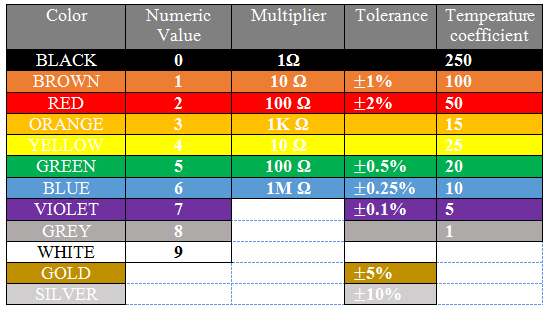Our 6-band resistor color code calculator provides the most precise resistance calculations with temperature coefficient specifications. 6-band resistors offer the highest accuracy with three significant digits, tight tolerances, and temperature stability information (ppm/K) for critical applications. Simply select the colors from each band in the calculator above to determine resistance, tolerance, and temperature coefficient values.
How to Calculate 6-Band Resistor Values?
Calculating 6-band resistor values requires understanding the most advanced resistor coding system. The first three bands represent significant digits, the fourth band is the multiplier, the fifth band indicates tolerance, and the sixth band specifies the temperature coefficient (ppm/K). This comprehensive system provides maximum precision and temperature stability data essential for high-precision applications. Use the resistor color code chart below to understand the complete calculation process.

When to Use 6-Band Resistors?
6-band resistors are the premium choice for applications requiring both high precision and temperature stability. The sixth band (temperature coefficient) indicates how resistance changes with temperature, typically measured in parts per million per Kelvin (ppm/K). Lower ppm/K values mean better stability across temperature variations.
Critical applications for 6-band resistors: Precision measurement equipment, laboratory instruments, aerospace electronics, medical devices, and high-end audio equipment. For applications not requiring temperature coefficient data, our 5-band resistor calculator or 4-band resistor calculator may be more cost-effective.
Calculating resistance for a 6-band resistor

![]()
‘a’ represents the 1st significant digit, which is the first band color of resistor.
‘b’ represents the 2nd significant digit, which is the second band color of resistor.
‘c’ represents the 3rd significant digit, which is the third band color of resistor.
‘d’ represents the 4th significant digit, which is the fourth band color of resistor and this is the multiplier value used in formula.
‘e’ represents the 5th significant digit, which is the fifth band color of resistor and this is the tolerance value of resistor.
‘f’ represents the 6th significant digit, which is the sixth band color of resistor and this is the temperature coefficient value of resistor.
| 6-Band | Name | Description |
| 1st Band | a | 1st significant digit |
| 2nd Band | b | 2ndsignificant digit |
| 3rd Band | c | 3rdsignificant digit |
| 4th Band | d | Multiplier |
| 5th Band | e | Tolerance |
| 6th Band | f | Temperature Coefficient |
Step-by-Step 6-Band Resistor Calculation Example
Let's calculate a 6-band resistor with the colors: Brown, Black, Orange, Red, Gold, Brown
Step 1: First band (Brown) = 1
Step 2: Second band (Black) = 0
Step 3: Third band (Orange) = 3
Step 4: Fourth band (Red) = ×100 (multiplier)
Step 5: Fifth band (Gold) = ±5% (tolerance)
Step 6: Sixth band (Brown) = 100 ppm/K (temperature coefficient)
Calculation: (1×100 + 0×10 + 3) × 100 = (100 + 0 + 3) × 100 = 10,300 Ohms or 10.3kΩ with ±5% tolerance
Temperature coefficient: 100 ppm/K means the resistance will change by 100 parts per million for each degree Kelvin of temperature change. For example, at 25°C above reference temperature, this 10.3kΩ resistor could measure between 10.274kΩ and 10.326kΩ due to temperature effects alone.
High-Precision Applications for 6-Band Resistors
6-band resistors are engineered for the most demanding applications where both precision and temperature stability are critical. The temperature coefficient specification makes them indispensable in environments with varying temperatures or where extreme accuracy is required.
Professional Applications Using 6-Band Resistors:
Aerospace & Defense: Flight control systems, navigation equipment, and military-grade electronics operating in extreme temperature ranges.
Medical Equipment: Patient monitoring devices, diagnostic instruments, and life-support systems requiring reliable measurements.
Laboratory Instruments: Precision multimeters, calibration equipment, and research instruments - complement with our resistor wattage calculator for power analysis.
Automotive Electronics: Engine control units and sensor circuits exposed to wide temperature variations.
High-End Audio: Professional recording equipment and audiophile-grade amplifiers where component stability affects sound quality.
Temperature-Stable Resistor Networks:
When designing circuits with multiple 6-band resistors, maintaining temperature stability across the entire network is crucial. Use our series resistor calculator or parallel resistor calculator to calculate total resistance while considering how temperature coefficients affect overall circuit stability.
6-Band Resistor Calculator FAQ
What does the temperature coefficient (ppm/K) mean?
Temperature coefficient indicates how much the resistance changes per degree of temperature change, measured in parts per million per Kelvin (ppm/K). A 100 ppm/K resistor will change by 0.01% per degree Celsius. Lower values like 5-25 ppm/K indicate superior temperature stability for precision applications.
When should I use 6-band instead of 5-band resistors?
Use 6-band resistors when your application experiences temperature variations and requires predictable performance. The temperature coefficient data helps calculate resistance drift in varying environments. For standard precision needs without temperature concerns, our 5-band resistor calculator is sufficient.
How do I read the sixth band color for temperature coefficient?
The sixth band follows a different color code than the resistance bands. Brown = 100 ppm/K, Red = 50 ppm/K, Orange = 15 ppm/K, Yellow = 25 ppm/K, Blue = 10 ppm/K, and Violet = 5 ppm/K. Lower numbers indicate better temperature stability.
Are 6-band resistors more expensive than other types?
Yes, 6-band resistors typically cost more due to their precision manufacturing and temperature testing requirements. However, they're essential for applications where temperature-induced resistance changes could cause circuit malfunction or measurement errors.
Can I use a 6-band resistor in place of a 4-band or 5-band resistor?
Electrically yes, but it's usually cost-ineffective. Use our 4-band calculator for general circuits or wattage calculator to ensure proper power ratings regardless of band count.

